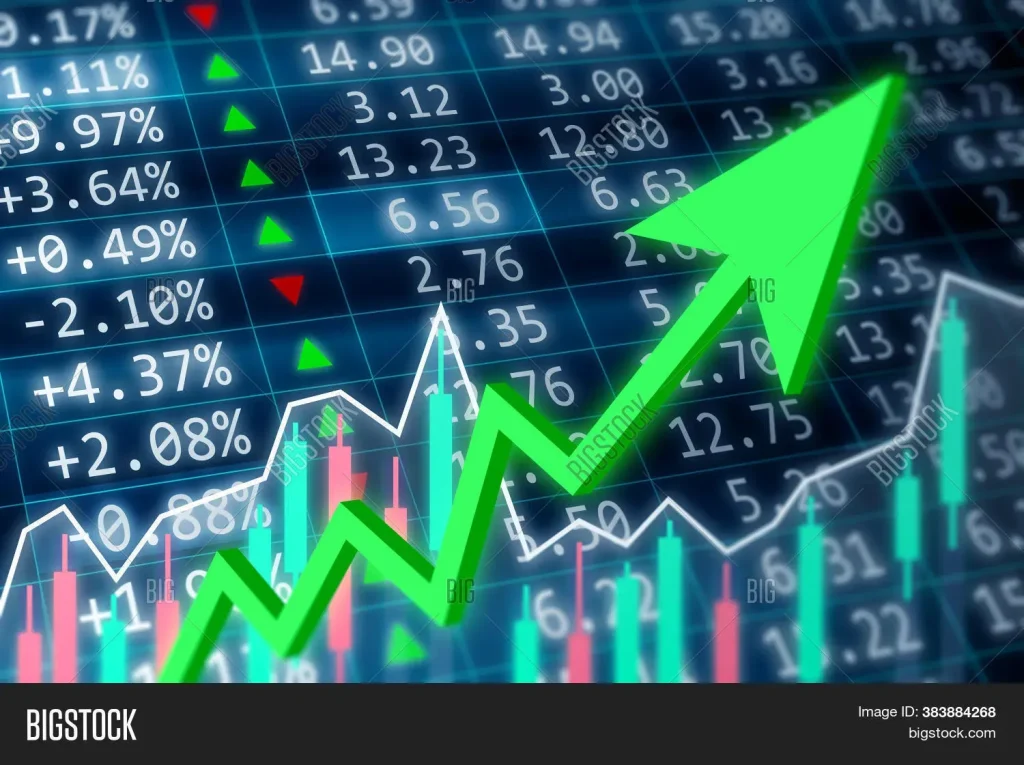The Stock Market is currently navigating a complex landscape filled with uncertainty and evolving investor sentiment. Recently, the S&P 500 has remained relatively stable, even as President Donald Trump reaffirmed his contentious Aug. 1 tariff implementation date. Despite the challenges posed by escalating tariffs on multiple countries, traders are closely monitoring stock updates to gauge market reactions. As equities fluctuate, particularly with notable movements in major indices like the Dow Jones Industrial Average and Nasdaq Composite, the market’s direction remains to be seen. Investors are trying to decipher the implications of these tariffs while balancing optimism and skepticism regarding economic growth.
The equity market, often referred to as the stock exchange, reflects the heartbeat of economic activity and investor confidence. Amidst a backdrop of trade tensions, particularly involving tariffs imposed by former President Trump, traders are responding with varied sentiment. The latest fluctuations in indices such as the S&P 500 signal a significant interplay of market forces. Investors are now more eager than ever to stay updated on market trends and stock fluctuations, seeking clarity amid the surrounding noise. This intricate dance of buying and selling shares has resulted in a cautious yet hopeful atmosphere as participants weigh potential risks against growth opportunities.
Current Stock Market Performance
The latest trading session has shown a mixed performance across the major indices in the stock market. As of this morning, the S&P 500 remains relatively unchanged, indicating that traders are absorbing the recent news about tariff implementations without significant panic. Although there has been a minor increase in the Nasdaq Composite by 0.2%, the Dow Jones Industrial Average experienced a slight decline of 126 points, reflecting investor caution amidst political commentary. The news cycle continues to ripple through the markets, influencing investor sentiment and resulting in a cautious approach as traders weigh economic implications.
Despite the minor fluctuations, many analysts suggest that the overall landscape remains bullish. The market’s resilience can partly be attributed to shifting investor sentiment that is becoming increasingly optimistic despite fears surrounding tariffs. Notably, companies like Nvidia have shown signs of growth, creeping up toward a $4 trillion market cap, signaling strength in certain sectors of the equity market. Overall, investors seem to be re-evaluating potential impacts from tariffs and adjusting their positions accordingly.
Impact of Tariffs on Investor Sentiment
The recent announcement by President Donald Trump regarding the implementation of tariffs has sparked considerable debate among investors. While tariffs can typically create uncertainty, contributing to volatility in global markets, many investors appear more resolute in their confidence in U.S. equities. Analysts suggest that the perception of tariffs as temporary and manageable has led to a surge in bullish sentiment, moving past fears about their potential long-term impacts on growth and earnings. Financial institutions are observing a divided market where some sectors languish under tariff pressures while others thrive.
Bill Merz from U.S. Bank Wealth Management stated that the market’s ability to absorb tariff announcements indicates a significant shift in investor behavior. This renewed optimism has helped the stock market hover near all-time highs across various indices, as traders anticipate that the tariffs will not adversely affect earnings as previously thought. The equity market’s resilience showcases that investors are adjusting to new information continuously, making strategic moves that reflect unwavering confidence in the possibilities for growth and recovery despite tariff-driven headwinds.
Potential Consequences of Trade Policies
The introduction of tariffs by the Trump administration raises critical questions about the long-term implications for international trade and market dynamics. With the imposition of 25% tariffs on countries such as South Korea and Japan, there is a concern that such policies could lead to retaliatory measures, escalating trade tensions. This environment could potentially alter investor strategies and force businesses to rethink their supply chains. Observers fear that while short-term gains may be witnessed in certain markets, the broader repercussions on global growth could dampen future performance.
Moreover, the impact of these tariffs goes beyond immediate stock prices; they have the potential to influence inflation expectations and cost structures across industries. For instance, companies relying heavily on imported goods may face increased costs, which can then affect consumer prices and overall demand. Investors should remain vigilant and attentive to economic indicators that reflect these shifts. The broader question remains whether investor sentiment will continue to adapt to the evolving trade climate or if uncertainty will eventually overshadow market optimism.
Insights from Financial Analysts
Financial analysts have begun to assess the implications of Trump’s trade policies and the potential direction of the stock market in response. Reports from major financial institutions like Bank of America suggest that despite recent pressures, the market is not yet at a tipping point. Analysts are closely monitoring GDP trends, inflation rates, and corporate earnings forecasts to gauge how these factors may interplay with ongoing tariff discussions. The insights deduced from these analyses offer valuable perspectives for both institutional and retail investors in navigating this complex market terrain.
Moreover, analysts emphasize the importance of maintaining a diversified portfolio to mitigate risks associated with international trade fluctuations. Firms that are more resistant to tariff-driven shifts or those operating in sectors less reliant on foreign supply chains could emerge as favorable investments. A bullish outlook from investor Keith Lerner reinforces the notion that robust sectors like technology and consumer goods may still provide ample opportunities for gains amidst turmoil surrounding tariffs and trade policies.
Market Reactions to Recent Economic News
With every announcement from the White House regarding tariffs or trade negotiations, market reactions become increasingly pronounced. For example, the recent tariff announcements led to mixed outcomes within various sectors, illustrating how sensitive the stock market is to economic policies. On a day when Trump confirmed that no extensions would be granted for the Aug. 1 deadline, stocks opened relatively unchanged, indicative of a careful balancing act between optimism and caution among traders. Such market behaviors showcase the intricate relationship between political developments and investor activity.
Economic news, such as consumer surveys indicating inflation expectations stabilizing, plays a crucial role in shaping investor decisions. Recent updates revealing rising copper prices following tariff announcements highlight how commodities, too, are affected by international trade relations. Traders are advised to stay connected with real-time stock updates and sector performance metrics to adjust their strategies promptly. Ultimately, how markets respond to ongoing and upcoming economic news will be essential in shaping investment strategies and expectations moving forward.
Sectoral Performance Amidst Tariff Announcements
The ongoing trade tensions and tariff announcements have led to varied performances across different sectors within the stock market. For instance, financial stocks have faced headwinds with significant downgrades from institutions such as HSBC, which adversely affected shares of major banks like JPMorgan and Bank of America. On the other hand, tech stocks have shown resilience, with companies like Nvidia continuing to edge higher, reflecting strong demand and investor confidence in the technology sector.
This divergence highlights the importance of sector allocation in investment strategies, particularly during times of economic uncertainty. Investors should pay close attention to how sectors react to tariff-related news, as these reactions can present both opportunities and vulnerabilities. As businesses recalibrate their strategies in line with evolving policies, certain sectors may experience growth while others struggle, necessitating a dynamic approach to portfolio management.
Key Market Drivers to Watch
As the stock market continues to react to the evolving economic landscape, several key drivers are pivotal for investors to watch closely. Key factors include not only tariff implications but also central bank policies, global economic growth forecasts, and consumer sentiment, which can all significantly influence market trajectories. The uncertainty surrounding future economic policies can create both volatility and opportunity within the stock market.
Investor sentiment can pivot quickly based on news related to tariffs or economic reports. Analysts recommend remaining adaptable and considering how these drivers influence different industry sectors. Staying informed with stock updates, market trends, and insights from financial experts can empower investors to make well-informed decisions and position their portfolios favorably as market sentiment shifts.
Challenges and Opportunities Ahead
Navigating the current stock market environment, characterized by tariff discussions and fluctuating investor sentiment, poses significant challenges for many traders. While the immediate implications of newly imposed tariffs might seem daunting, strategic players in the market could potentially capitalize on emerging trends. Analysts suggest that understanding the complexities of how tariffs impact different sector performances could lead to valuable opportunities for savvy investors.
Moreover, the potential for tariffs to inadvertently stimulate certain industries cannot be overlooked. As domestic companies adjust to rising costs associated with imported goods, there may be opportunities for growth in alternative products or domestic sourcing strategies. As the market experiences fluctuations in response to external pressures, investors are encouraged to maintain a forward-looking perspective and seek out promising investment avenues that may arise from these changes.
Future Stock Market Predictions
Looking ahead, predictions about the stock market’s trajectory amid ongoing political and economic changes remain varied. Market experts project that in the face of domestic tariff policies, investor behavior will be heavily influenced by economic indicators, overall corporate earnings, and geopolitical developments. Those investors who remain informed and adaptable are likely to navigate these changes more successfully, adjusting their portfolios in response to news updates and market movements.
Furthermore, some financial analysts maintain that despite short-term uncertainties related to tariffs, the underlying fundamentals of the U.S. economy may provide a more stable outlook. As long as corporate earnings continue to reflect growth and sectors demonstrate resilience to external shocks, the broader equity markets could maintain their upward trajectory. Future stock market predictions will hinge on a careful balance of monitoring political developments while also focusing on the fundamental financial health of individual companies across various industries.
Frequently Asked Questions
What impact does Donald Trump’s tariffs have on the stock market?
Donald Trump’s tariffs can create volatility in the stock market, as evidenced by recent market fluctuations following his announcements. The uncertainties surrounding tariff implementations have the potential to influence investor sentiment strongly, leading to mixed results in indices like the S&P 500.
How is the S&P 500 reacting to investor sentiment regarding tariffs?
The S&P 500 has shown relative stability even amid tariff announcements, indicating that investor sentiment may be adapting to the changes. Despite tariffs, many investors remain optimistic, reflecting a bullish outlook on equities as seen in recent pricing trends.
What are the latest stock updates related to tariffs and the market?
Recent stock updates include mixed performances across major indices, with the Dow experiencing declines of 126 points due to tariff fears while the Nasdaq Composite saw slight gains. Investor reactions are closely monitoring statements regarding tariffs from Trump and other financial leaders.
How do tariffs influence investor sentiment in the stock market?
Tariffs play a crucial role in shaping investor sentiment in the stock market. Market participants often react to tariff announcements with volatility, as they assess potential impacts on economic growth and corporate earnings, leading to shifts in trading strategies and asset allocations.
Why did the Dow Jones fall despite a stable S&P 500 performance?
The Dow Jones fell due to specific sector pressures, primarily influenced by banks responding to HSBC’s cautious stance on large financial institutions, coupled with ongoing tariff anxieties from Trump’s recent announcements. This divergence illustrates how different sectors respond uniquely to market news.
| Market Index | Change | Key Developments |
|---|---|---|
| S&P 500 | Unchanged | Stable trading despite tariff uncertainty. |
| Nasdaq Composite | +0.2% | Small rise amid market fluctuations. |
| Dow Jones Industrial Average | -126 points (-0.3%) | Decline following tariff announcements. |
| Nvidia | +0.8% | Approaching a $4 trillion market cap. |
| Bank Stocks | Declined | HSBC downgrade impacts major banks. |
| Copper Prices | Record levels | Soared after tariff announcements. |
Summary
The Stock Market today continues to face uncertainties as investors grapple with mixed signals from President Trump regarding tariffs. While the S&P 500 remained unchanged, the Dow dropped significantly, highlighting the influence of tariff announcements on market performance. Despite these challenges, some analysts remain optimistic about the market’s potential, noting a shift in investor sentiment towards a more bullish outlook. Overall, the current dynamics within the Stock Market indicate a complex landscape influenced by both tariff policies and investor confidence.



